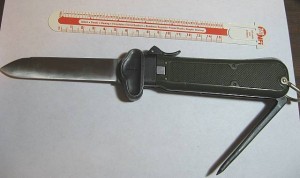Criminal Possession Of A Weapon: What Mental Intent (Mens Rea) Is Necessary
People v Parilla
New York Court of Appeals
2016 NY Slip Op03417
Decided on: May 3, 2016
Issue: Whether defendant’s lack of knowledge that the knife he possessed was a gravity knife is exculpatory under Penal Law 265.01 criminal possession of a weapon in the fourth degree.
Holding: No. The Court of Appeals held that based upon statutory language, the mens rea prescribed by the Legislature for criminal possession of a gravity knife simply requires a defendant’s knowing possession of a knife, not knowledge that the knife meets the statutory definition of a gravity knife.
Facts: Police stopped defendant for a traffic infraction. An officer patted him down for weapons at which time defendant admitted that he had a knife in his pocket. One of the officers tested the knife to determine whether it was a gravity knife by flicking his wrist with a downward motion; the blade opened and locked into place. Defendant was arrested and charged with third-degree criminal possession of a weapon, namely a gravity knife.
At trial, defendant testified that he bought the knife at a store in the Bronx. He stated that he opened the knife with two hands and never opened it with one hand by flicking his wrist. Over defendants objection, the trial court charged the jury as follows:
A person knowingly possesses a gravity knife when that person is aware that he is in possession of a knife. A person does not have to know that the knife is specifically a gravity knife or that it fits the legal description of a gravity knife in order to knowingly possess it. The People are only required to prove that the defendant, with respect to the knowledge element, knowingly possessed the knife.
The charge also required the jury to find that the knife defendant possessed,?did in fact meet the statutory definition of a gravity knife. Defendant was found guilty of criminal possession of a weapon in the third degree. The Appellate Division affirmed holding that the trial court properly instructed the jury that the knowledge element would be satisfied by proof establishing defendants knowledge that the knife met the statutory definition of a gravity knife. A Judge of this Court granted leave to appeal and the Court affirmed.
Legal Analysis: Penal Law 265.00 (5) defines gravity knife as any knife which has a blade which is released from the handle or sheath thereof by the force of gravity or the application of centrifugal force which, when released, is locked in place by means of a button, spring, lever or other device.
The Penal Law identifies gravity knives as per se weapons and criminalizes the mere possession of one, People v Brannon, 16 NY3d 596, 599 (2011). In other words, section 265.01 (1) criminalizes the mere possession, and not use , of a gravity knife.
The Court of Appeals held that to be convicted of criminal possession of a weapon for possessing a gravity knife under Penal Law 265.01(1), defendants must know that they possessed the knife. Indeed, the corpus delicti of weapons possession under Penal Law 265.01(1) is the voluntary, aware act of the possession of a weapon, People v Sanders, 85 NY2d 339, 341-342 (1995).
Here, Defendant argues that the People were required to establish that he knew that the knife met the statutory definition of a gravity knife; the Court disagrees holding that Penal Law 265.01(1) does not require the People to prove that defendant knew that the knife in their possession met the statutory definition of a gravity knife. The plain language of that subdivision demonstrates that the Legislature intended to impose strict liability to the extent that defendants need only be aware of physical possession of the knife.
A line of Appellate Division cases supports the Court of Appeals conclusion. In People v Berrier, the defendant was convicted of, among other crimes, criminal possession of a weapon in the third degree, see, AD2d 456, 457 [1st Dep 1996], lv denied 88 NY2d 876 [1996]. The First Department held that the trial court correctly charged that in order to convict the defendant of possessing a gravity knife, the prosecution had to prove that defendant knew he had a knife in his possession, not that he knew it was specifically a gravity knife, and that the knife fit the legal description of a gravity knife under Penal Law 265.00(5). The court continued: Knowledge that the thing possessed answers the description of one of the prohibited instruments is not an element of third-degree criminal possession of a weapon, People v Herbin, 86 AD3d 446, 447 [1st Dept 2011].
 The Court of Appeals held that their determination is also consistent with cases concluding that defendant’s knowledge of a firearms operability is not an element of criminal possession of a weapon. Defendants need only knowingly possess a firearm, they need not know the firearm was loaded or operable, Sanders, 85 NY2d at 341-342; People v Brown, 107 AD3d 1477, 1478 [4th Dept 2013], lv denied 21 NY3d 1040 [2013] ;People v Melendez, 71 AD3d 1166, 1167 [2d Dept 2010], lv denied 15 NY3d 753 [2010].
The Court of Appeals held that their determination is also consistent with cases concluding that defendant’s knowledge of a firearms operability is not an element of criminal possession of a weapon. Defendants need only knowingly possess a firearm, they need not know the firearm was loaded or operable, Sanders, 85 NY2d at 341-342; People v Brown, 107 AD3d 1477, 1478 [4th Dept 2013], lv denied 21 NY3d 1040 [2013] ;People v Melendez, 71 AD3d 1166, 1167 [2d Dept 2010], lv denied 15 NY3d 753 [2010].
